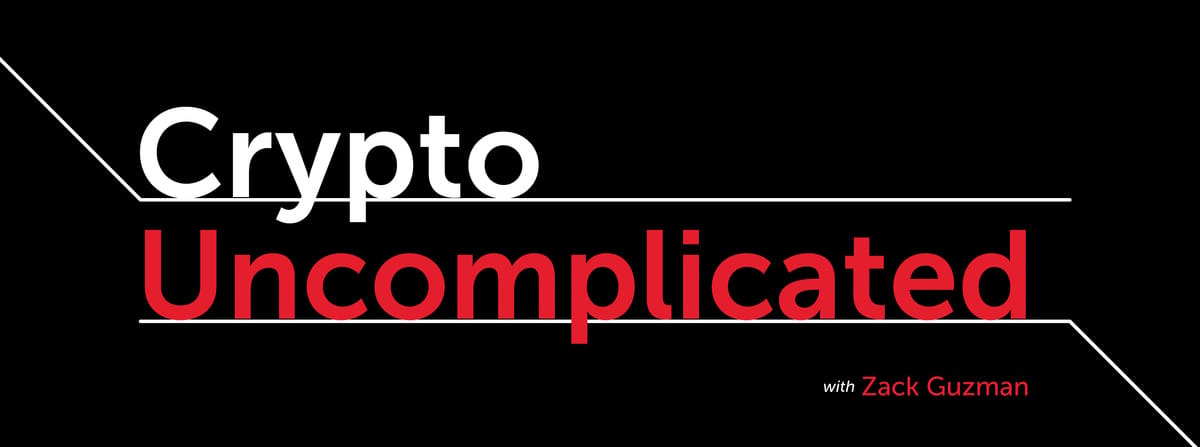- Crypto Uncomplicated
- Posts
- The SEC is going after the biggest NFT project
The SEC is going after the biggest NFT project
First, it was Kim Kardashian. Now the SEC is coming for NFTs enjoyed by Snoop Dogg, Jimmy Fallon, and Madonna

Crypto Uncomplicated is a free crypto newsletter distilling all the happenings in the crypto space.
Anyone who has been reading Crypto Uncomplicated this year already knows the Bored Ape Yacht Club as one of the most influential NFT projects in the world.
In fact, even if you haven't been reading my newsletter, it'd be hard to avoid the cartoon apes. Jimmy Fallon talked about his Bored Ape NFT on his own show. Eminem and Snoop Dogg performed as Apes at the MTV VMAs. They have become the hottest NFT project by capturing the imagination of cultural elites and commoners alike (so long as the commoners want to spend hundreds of thousands of dollars buying the cartoon monkey art.)
(Still wondering what an NFT is? Read "What is an NFT")

Jimmy Fallon holds up artwork corresponding to a Bored Ape Yacht Club NFT. (Source: NBC screenshot)
By size, the company behind Bored Ape Yacht Club, Yuga Labs, is by far the largest player in the NFT space. They control not only Bored Apes, but five of the top eight NFT projects by market cap, including CryptoPunks, Mutant Apes, and Otherdeed.
But that's not why the NFT collection is in the news again this week. It's because, once again, the Securities and Exchange Commission is looking into whether securities laws were violated. According to Bloomberg's Tuesday report, the probe isn't just into whether the digital cartoon monkeys are more akin to stocks than to art, but also explores the "airdrop" of ApeCoin crypto tokens that occurred earlier this year. As I covered in an earlier edition of Crypto Uncomplicated, Yuga Labs distributed ApeCoin to existing holders of Bored Ape NFTs, Mutant Ape NFTs, and other Yuga Labs NFT projects. Soon after, ApeCoin also began to trade on some of the largest crypto exchanges, including CoinBase.
In some cases, people received more than $100,000 worth of ApeCoin through that drop from Yuga Labs. But if you didn't have an NFT and wanted to own it, you'd have to buy it. It seems the SEC is concerned with Yuga not disclosing any of the risks around ApeCoin for those buyers and is pretty interested in exploring what those people were led to believe they would be getting out of buying it. (The price of ApeCoin has fallen by about 50% since its launch back in March.)

Bored Ape NFTs and other top NFTs are referred to as so-called "bluechip NFTs" meant to mimic "bluechip stocks" or those that are most commonly traded. They are among the most well-known and, now, most targeted by the SEC. (Source: Screenshots)
In the eyes of most NFT communities, the idea of introducing a token is one that makes sense. They want to open up the ability to vote on what community members want. For Yuga's "Otherside" metaverse project, that meant giving NFT holders ApeCoins to vote on proposals. But, they could've certainly just done that with existing NFT holders. The problem is, there are only ever going to be 10,000 Bored Apes NFTs. How do you scale a project to become mainstream if you limit your project to 10,000 fans? You can't.
So, you could create NFT offshoot projects like Mutant Ape Yacht Club (which Yuga did) but that is also limited to how many NFTs you create.
By minting a separate token, you can have more people speculate, and buy your token. Trading at $10 also makes it a lot more accessible to buy than an NFT that costs north of $100,000. However, that also opens you up to the SEC coming after you. Because now it's not just artwork you're selling. You're selling a token that has very clear line to potentially being seen as a "security" in the eyes of the SEC who might see you offering an "ownership stake" in something. SEC Chair Gary Gensler has been warning for months that he'd be looking to crack down on any operator in crypto that doesn't register with the SEC in selling securities. Can't say he didn't warn anyone.
For its part, Yuga had a pretty canned response to the announcement of the SEC probe:
“It’s well-known that policymakers and regulators have sought to learn more about the novel world of web3. We hope to partner with the rest of the industry and regulators to define and shape the burgeoning ecosystem,” Yuga said in a statement to Bloomberg News. “As a leader in the space, Yuga is committed to fully cooperating with any inquiries along the way.”

The price of ApeCoin has fallen by about 50% over the last six months. (Source: CoinMarketCap)
For a centralized operator like Yuga Labs, which accounts for more than 25% of the entire NFT market cap, it's an easy target for the SEC to make an example out of. That said, simply investigating a company doesn't mean they've done anything wrong. But things are certainly heating up.